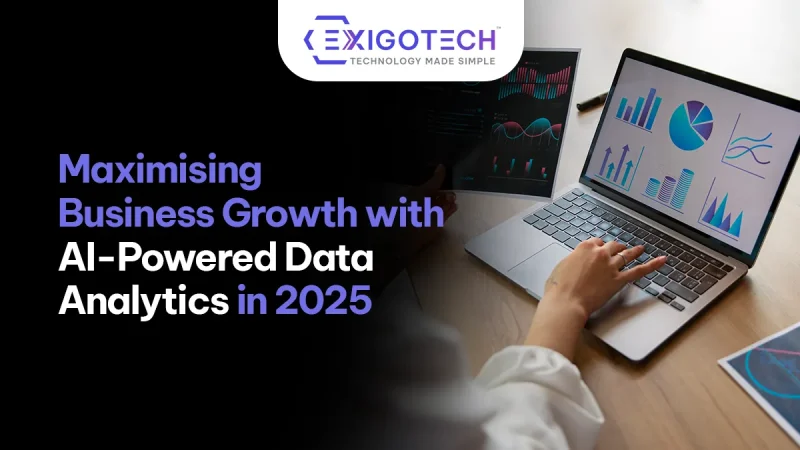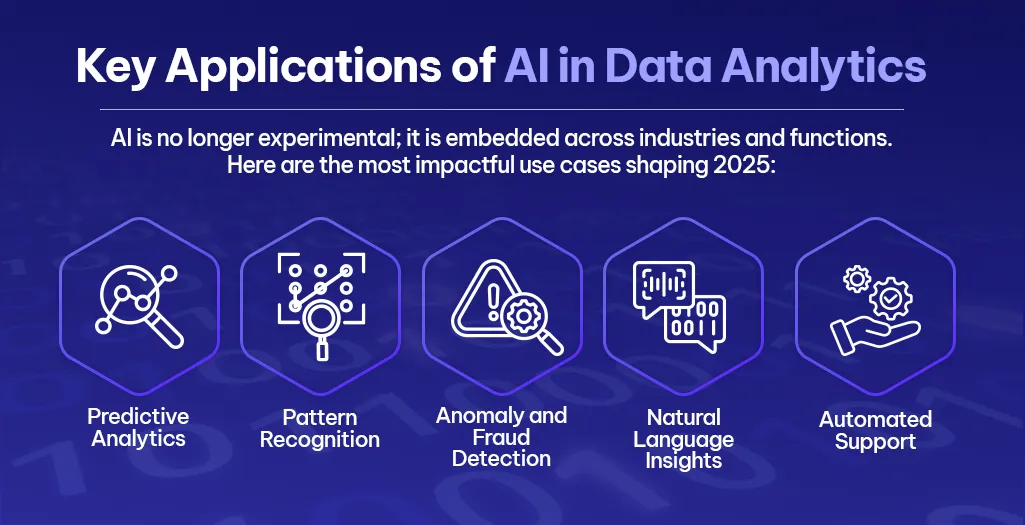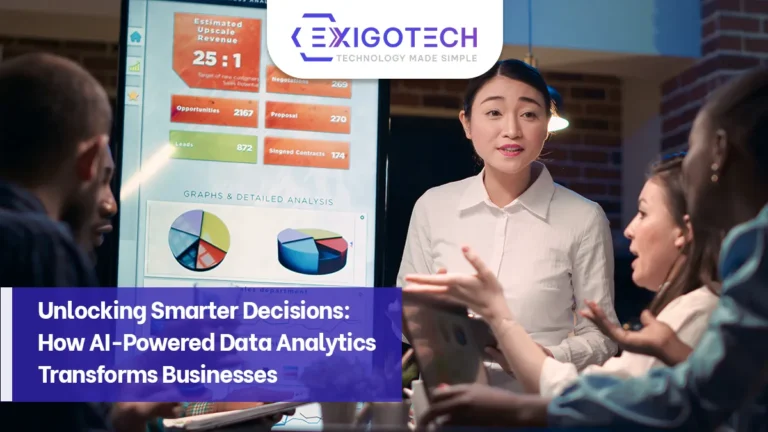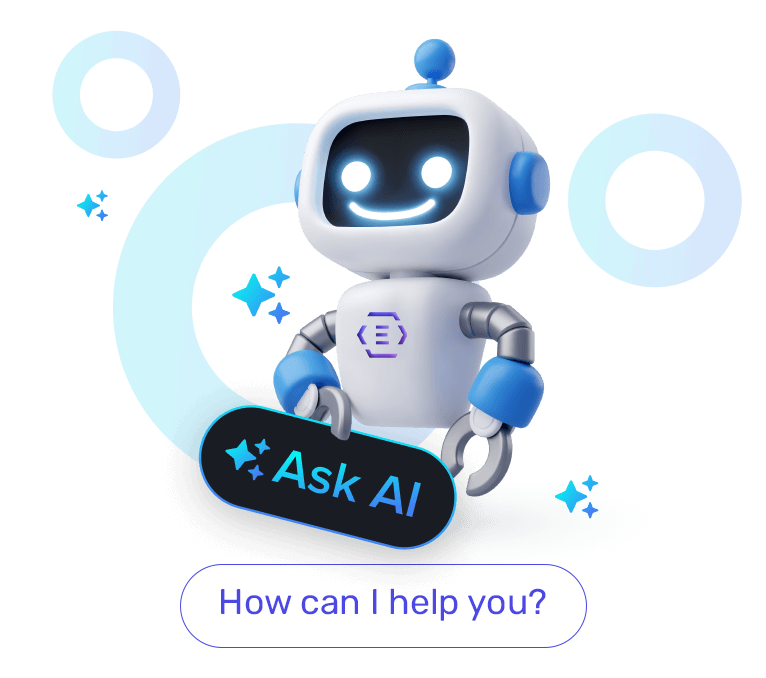Why AI in Data Analytics Matters More Than Ever
Data is the backbone of every modern business. From digital transactions and IoT sensors to social media and customer interactions, organisations generate large amounts of information every second. According to Statista, global data creation is projected to exceed 180 zettabytes in 2026. But raw data, no matter how vast, has little business value unless it is translated into insights and actions.
This is where Artificial Intelligence (AI) is rewriting the rules of data analytics. Traditional methods that rely on manual coding or static statistical models cannot keep pace with the speed, scale, and complexity of today’s business environments. AI bridges this gap by automating analysis, detecting patterns hidden from human eyes, and delivering real-time, actionable insights.
Businesses that harness AI in their analytics strategies are better positioned to anticipate customer needs, optimise operations, detect risks, and gain a sustainable competitive edge. In this blog, we explore how AI is transforming data analytics in 2026, the benefits it delivers, the challenges to adoption, and how Exigo Tech helps organisations make the most of this opportunity.
From Traditional to AI-Powered Analytics: A Shift in Capabilities
For years, analytics was based on statistical techniques, rule-based models, and structured datasets. These approaches served businesses well when data volumes were limited, but they struggle in today’s dynamic environments.
Let’s compare the two approaches:
| Traditional Analytics | AI-Powered Analytics |
| Manual coding and statistical models | Automated model generation using machine learning |
| Static insights based on pre-defined rules | Self-learning algorithms that improve over time |
| Primarily structured data (tables, numbers) | Structured + unstructured data (text, images, video, IoT) |
| Insights at an aggregate level | Context-specific, personalised insights |
| Delayed decision-making | Real-time, predictive, and prescriptive intelligence |
Businesses that adopt AI are no longer just looking at what happened in the past; they are gaining insights into what will happen next and guidance on what actions to take.
Key Applications of AI in Data Analytics
AI is no longer experimental; it is embedded across industries and functions. Here are the most impactful use cases shaping 2026:
-
Predictive Analytics
AI uses historical data and machine learning models to forecast outcomes with high accuracy.
- Retail: Predicting seasonal demand and optimising inventory.
- Finance: Anticipating loan defaults or fraudulent transactions.
- Healthcare: Forecasting patient readmissions or disease outbreaks.
Predictive analytics enables businesses to shift from reactive firefighting to proactive planning.
-
Pattern Recognition
Deep learning algorithms excel at identifying hidden patterns in text, images, and videos.
- Manufacturing: Detecting product defects through image analysis.
- Marketing: Analysing customer behaviour trends for targeted campaigns.
- Public safety: Processing CCTV feeds for crowd monitoring and threat detection.
The ability to extract insights from unstructured data gives AI a clear advantage over traditional methods.
-
Anomaly and Fraud Detection
AI systems analyse data streams in real time, comparing activity against established norms to detect suspicious behaviour.
- Banks: Identifying fraudulent card transactions instantly.
- Telecoms: Spotting irregular usage patterns to prevent SIM fraud.
- Cybersecurity: Blocking intrusions before damage occurs.
This capability reduces losses and strengthens trust with customers.
-
Natural Language Insights
Natural Language Processing (NLP) allows businesses to mine meaning from text-heavy data sources.
- Analysing customer feedback, reviews, and support tickets.
- Monitoring employee engagement surveys for morale insights.
- Extracting market sentiment from news and social media.
This enables organisations to act on human language in the same way they analyse numbers.
-
Automated Decision Support
AI doesn’t just analyse data, it provides prescriptive recommendations.
- Suggesting the next best offers for e-commerce customers.
- Recommending preventive maintenance schedules for utilities.
- Optimising pricing strategies in competitive industries.
This moves analytics beyond dashboards into direct business impact.
Benefits of AI in Data Analytics
AI adoption delivers value across multiple dimensions.
- Improved Decision-making
Data-driven insights replace guesswork, helping leaders make faster and more accurate decisions. - Accelerated Analysis
AI models can analyse terabytes of data in minutes, shrinking reporting cycles from weeks to seconds. - Greater Accuracy
Machine learning improves over time, reducing human error and enhancing reliability. - Unlocking Unstructured Data
AI can process text, images, voice, and video – sources often ignored by traditional tools. - Cost Efficiency
Automation reduces the manual effort needed for data preparation and reporting. - Market Agility
By anticipating customer behaviour and market shifts, businesses can stay one step ahead of competitors.
Challenges Businesses Face in AI Adoption
Despite its promise, AI adoption is not without obstacles. Organisations commonly face:
- Integration Complexity: Aligning AI systems with legacy infrastructure.
- Scalability Concerns: Ensuring models remain effective as data volumes surge.
- Talent Shortage: Finding skilled data scientists and AI engineers.
- Ethical and Privacy Issues: Responsible use of customer data is under scrutiny.
- Regulatory Compliance: Adhering to evolving industry rules on AI use.
- Cybersecurity Risks: AI systems, like all technologies, need protection against attacks.
- Cost of Implementation: Initial investments in infrastructure and training can be significant.
These challenges highlight the importance of having a strategic roadmap and the right technology partner to navigate adoption successfully.
The Future of AI in Data Analytics
Looking ahead, AI will move beyond analysis into shaping business strategy. Some 2026 trends include:
- Real-time AI: Continuous monitoring of IoT devices, supply chains, and digital interactions.
- Generative AI for Analytics: Conversational interfaces that explain data trends in plain English.
- AI + Cloud Platforms: Unified solutions such as Microsoft Fabric that simplify analytics pipelines.
- Hyper-personalisation: Insights customised to individual customers or micro-segments.
- Ethical AI Frameworks: Transparency, fairness, and accountability becoming standard practice.
How Exigo Tech Helps Businesses Harness AI
At Exigo Tech, we help organisations maximise the value of their data with end-to-end AI-driven analytics solutions.
- Data Integration: We unify structured and unstructured data sources for comprehensive insights.
- Custom AI Models: Customised analytics frameworks designed to meet specific business needs.
- Predictive and Prescriptive Insights: Helping clients move from “what happened” to “what’s next” and “what should we do.”
- Industry Expertise: Solutions aligned with sectors like finance, retail, energy, and more.
- Microsoft Partnership: Leveraging platforms such as Microsoft Fabric to deliver scalable, secure, and future-ready analytics environments.
By working with Exigo Tech, businesses can accelerate adoption, reduce complexity, and gain a competitive edge in the AI-driven future of data analytics.
Conclusion
AI is no longer optional in analytics; it has become essential. In 2026, businesses that embrace AI will make faster decisions, understand their customers better, and unlock new growth opportunities. Those who delay risk being left behind in a data-driven economy.
With Exigo Tech as your partner, you can confidently adopt AI-powered analytics, overcome adoption challenges, and turn raw data into a strategic advantage.
 Australia
Australia Singapore
Singapore Philippines
Philippines India
India Alpesh Prajapati | Sep 12, 2025
Alpesh Prajapati | Sep 12, 2025






 Exigo Tech - Ask AI
Exigo Tech - Ask AI







